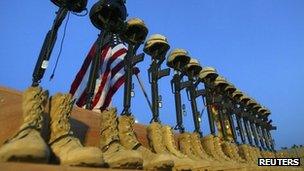Obama marks end of Iraq war at Fort Bragg
- Published
President Barack Obama: "You have shown why the US military is the finest fighting force in the history of the world"
US President Barack Obama has marked the end of the Iraq war by applauding the "extraordinary achievement" of US troops in a conflict he firmly opposed.
In a speech at Fort Bragg in North Carolina, he paid tribute to the soldiers who served and died in the war, and their families.
The last US soldiers are expected to withdraw from Iraq within days.
Republicans have criticised the pullout citing concerns over Iraq's stability, but most Americans support the move.
In Wednesday's speech, President Obama - who owes his presidency in part to his opposition to the Iraq war - hailed the bravery of US troops during the nearly nine-year conflict.
"Tomorrow the colours of the United States Forces Iraq, the colours you fought under, will be formally cased in a ceremony in Baghdad," said Mr Obama, who was on his first visit to Fort Bragg. "Then they'll begin their journey across an ocean back home.
"As your commander in chief and on behalf of a grateful nation, I'm proud to finally say these two words - welcome home, welcome home, welcome home," he told thousands of cheering troops in an aeroplane hangar.
Mr Obama announced in October that all US troops would leave Iraq by the end of 2011, a date previously agreed by former President George W Bush in 2008.
'Heads held high'
The last combat troops departed in August last year.
Mr Obama - who was joined by his wife Michelle, an active veterans' advocate - told the troops the US was leaving Iraq with "heads held high".
Some 1.5 million Americans had served in Iraq, nearly 4,500 had died and 30,000 had been wounded, Mr Obama said, adding that "those numbers don't tell the whole story of Iraq".
Recalling the roadside bombs and sniper attacks of the insurgency, he said: "Everything that American troops have done in Iraq, all the fighting and dying, bleeding and building, training and partnering, has led us to this moment of success."
"The war in Iraq will soon belong to history, and your service belongs to the ages," he added.
US troop numbers in Iraq peaked at around 170,000 during the height of the so-called surge strategy in 2007, but as of this week only about 5,500 remain.
President Obama has framed the withdrawal as a promise kept from his 2008 election campaign. During his bid for the White House, he stood as the anti-war candidate and emphasised the need to bring troops home and rebuild a troubled economy.
The conflict, launched by the Bush administration in March 2003, became hugely unpopular as claims that President Saddam Hussein was hiding weapons of mass destruction and supporting al-Qaeda militants turned out to be untrue.
Mr Obama said the war had been "a source of great controversy here at home, with patriots on both sides of the debate".
He acknowledged it was not perfect, but said they were leaving behind "a sovereign, stable and self-reliant Iraq, with a representative government that was elected by its people".
A strong Iraq?
The US president also assured troops he was committed to ensuring veterans find the jobs and resources they need back home.
"You stood up for America; now America must stand up for you," he said.

Nearly 4,500 US troops died in Iraq while tens of thousands of Iraqis also lost their lives
The unemployment rate for former US servicemen and women over the past decade has been higher than the national average.
The speech was not without political significance. Mr Obama narrowly won North Carolina in the 2008 election.
On Tuesday, he was joined by Iraqi Prime Minister Nouri Maliki in Washington as he said the US would continue to support Iraq.
However, there are concerns in Washington that Iraq lacks robust political structures or an ability to defend its borders.
There are also fears that Iraq could be plunged back into sectarian bloodletting, or be unduly influenced by Iran.
Nonetheless, a recent poll by the Pew Research Centre, external found that 75% of Americans backed the troop withdrawal.